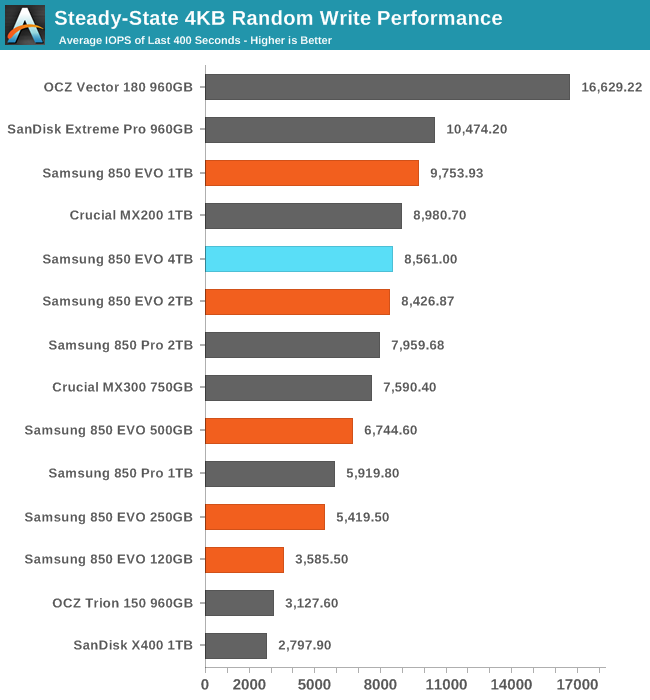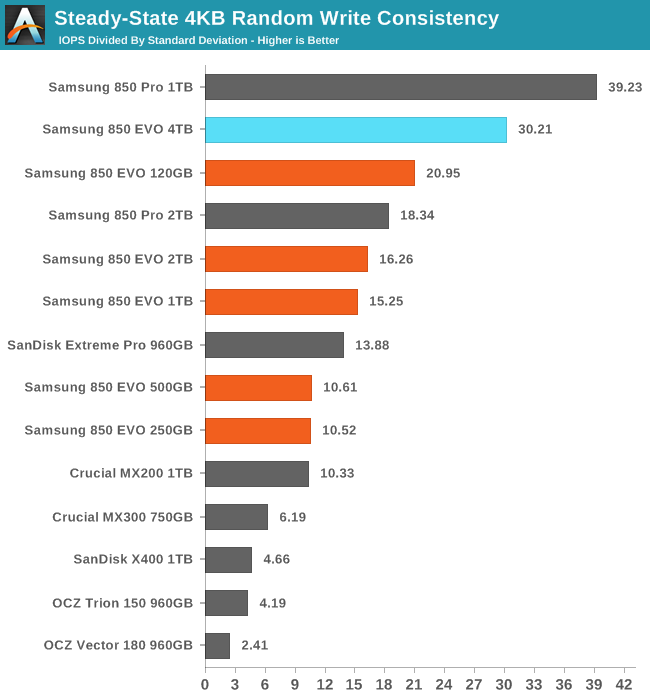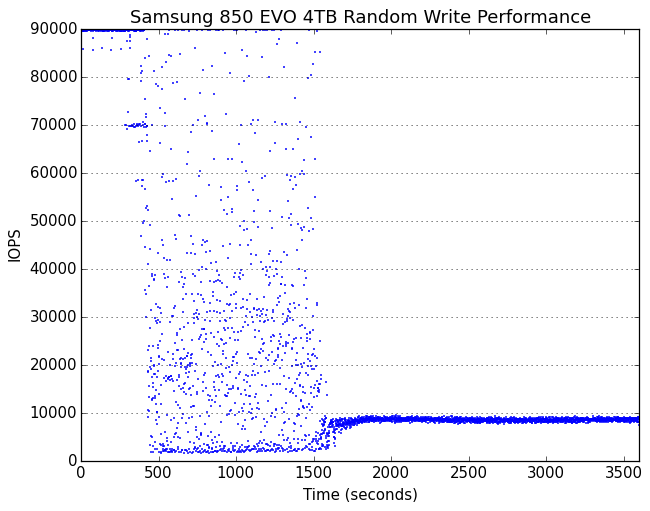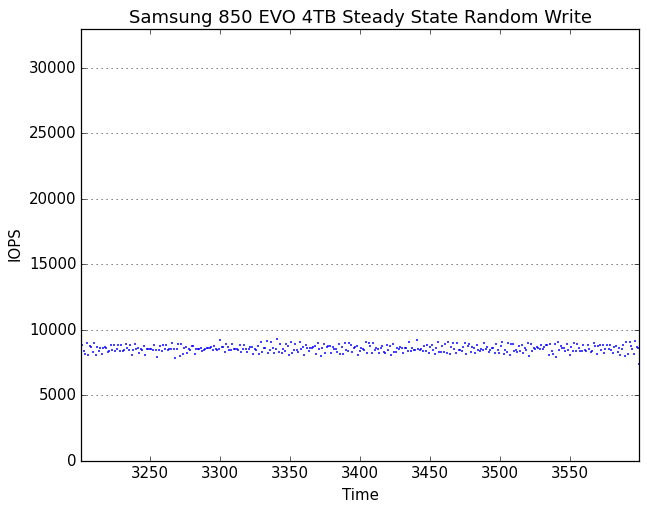The Samsung 850 EVO 4TB SSD Review
by Billy Tallis on July 11, 2016 10:00 AM ESTPerformance Consistency
Our performance consistency test explores the extent to which a drive can reliably sustain performance during a long-duration random write test. Specifications for consumer drives typically list peak performance numbers only attainable in ideal conditions. The performance in a worst-case scenario can be drastically different as over the course of a long test drives can run out of spare area, have to start performing garbage collection, and sometimes even reach power or thermal limits.
In addition to an overall decline in performance, a long test can show patterns in how performance varies on shorter timescales. Some drives will exhibit very little variance in performance from second to second, while others will show massive drops in performance during each garbage collection cycle but otherwise maintain good performance, and others show constantly wide variance. If a drive periodically slows to hard drive levels of performance, it may feel slow to use even if its overall average performance is very high.
To maximally stress the drive's controller and force it to perform garbage collection and wear leveling, this test conducts 4kB random writes with a queue depth of 32. The drive is filled before the start of the test, and the test duration is one hour. Any spare area will be exhausted early in the test and by the end of the hour even the largest drives with the most overprovisioning will have reached a steady state. We use the last 400 seconds of the test to score the drive both on steady-state average writes per second and on its performance divided by the standard deviation.

The 4TB 850 EVO restores a little bit of the performance that the 2TB lost relative to the 1TB, but Samsung's controller architecture is still clearly most comfortable at 1TB.

The consistency of the 2TB 850 EVO was only slightly better than the 1TB EVO, so it's surprising to see the 4TB model make such a large jump and come so close to the 1TB 850 Pro.
 |
|||||||||
| Default | |||||||||
| 25% Over-Provisioning | |||||||||
It is no surprise that a 4TB drive lasts so long before dropping out of peak performance: it has far more spare area to burn through than any ordinary consumer SATA SSD. The transition to steady state is uncharacteristically long and messy for a Samsung drive, and the performance lows during this period are disappointing. Once the drive has reached steady state, there's nothing to complain about.
 |
|||||||||
| Default | |||||||||
| 25% Over-Provisioning | |||||||||
There are no wild outliers from the 4TB 850 EVO's steady-state, and none of the longer-term drift in performance shown by the 1TB and 2TB 850 EVO and Pro models. With extra overprovisioning, the 4TB EVO carries on indefinitely with high and extremely steady performance.










145 Comments
View All Comments
Impulses - Monday, July 11, 2016 - link
I think it might take longer than that, the 1TB model hasn't budged much in the year since I bought 2, and neither has the 2TB after it's release... A 4TB faces even less direct competition than those do. I guess 3D NAND from others will eventually start to challenge Samsung tho, but it sure has taken them a while.mapesdhs - Wednesday, July 13, 2016 - link
I remember SanDisk saying not all that long ago that they wanted to release an 8TB model, but everything seems to have slowed down since then.I wonder sometimes if all of these companies are not really pushing the tech as fast as it could go because all of them in the meantime can make some decent money selling the various inbetween capacities.
Really it's kinda ridiculous that it's still possible to buy 128GB and lesser models, they're such price ripoffs. I remember that the 850 EVO 250GB went as low as 53 UKP over the xmas break, but now most places have it up past 75, while plenty of 120GB models are more than 50.
Just wish the public would stop buying the overpriced lower grade stuff.
Magichands8 - Monday, July 11, 2016 - link
And the reason this isn't being released with U.2 would be.....? Oh that's right! There isn't a reason. It was intentionally gimped with SATA performance. Great job Samsung! And it's only 4 times more expensive than it should be! Yep, I'm very glad that Optane is getting closer. I realize it isn't going to be super cheap at the start but it will be very interesting to see how it changes the landscape and what affect it has on the SSD market.Impulses - Tuesday, July 12, 2016 - link
More than likely they'll be faster, more expensive per GB, and smaller... :p AFAIK it'll compete with PCI-E & M.2 drives so it'll be priced accordingly, and that's ignoring that it'll likely require a whole new platform etc.Looking at a large capacity EVO as a purposeful gimping is very odd, the controller was originally designed and has always been used as a SATA controller.
You could maybe make that claim of a 2TB 950 Pro or something (if and when it happens)... But it's all but impossible to know how this series' controller would do on a different interface, or if that's even possibly.
Magichands8 - Tuesday, July 12, 2016 - link
It's laziness is what it is. And an attempt to milk more out of their SATA controller design. It's time though for the older technology to go the way of the Dodo. For years we've been hobbled by SATA and it doesn't make sense to me to have huge capacities and slow performance anymore. I'm glad to see Samsung releasing such a high capacity SSD but I'm almost insulted by the fact that so many "new" SSDs are being released based upon older technology and crippled by all of its limitations.Impulses - Wednesday, July 13, 2016 - link
A vast majority of people don't need anything better than SATA, so the R&D to go forth is balanced against that I'm sure... Like it or not, anything PCI-E/M.2/U.2 is still a niche right now... And it'd be a tiny niche if M.2 didn't also happen to be a decent form factor for laptops.Enthusiasts and power users are basically lucky that the mobile sector kinda spurred some performance innovation for once even if it's also kinda casting a shadow on U.2. Samsung's in it to maximize profits like anyone else...
mapesdhs - Wednesday, July 13, 2016 - link
Unfortunately the manufacturers know that at least for a while the niche status of tech like M.2 will allow them to charge much more for such products, pulling in people who can afford it and are willing to pay the premium. In theory competition should solve this, but sometimes I do wonder about possible pricing collusion when certain products seem to go through a particularly fishy looking price fluctuation.AnnonymousCoward - Tuesday, July 12, 2016 - link
Gimped with SATA? You do realize everything is CPU-bound unless you're copying to a RAM drive or running a benchmark, right? If you want to speed things up, buy a 6700K and OC it.KoolAidMan1 - Monday, July 11, 2016 - link
I can't wait until price per GB drops some more. Its actually very affordable by that metric but I'd still want to wait for it to drop to around $800 before buying one myself.Impulses - Tuesday, July 12, 2016 - link
It'll be a while, the 2TB is like $600 and has barely dropped by $100 since launching last year... Once those hit $500 or less I could be in for one, unless the 4TB's price has also budged a ton by then. I think the largest capacity always sees the smallest dips tho, specially in this case where competition is non existent.